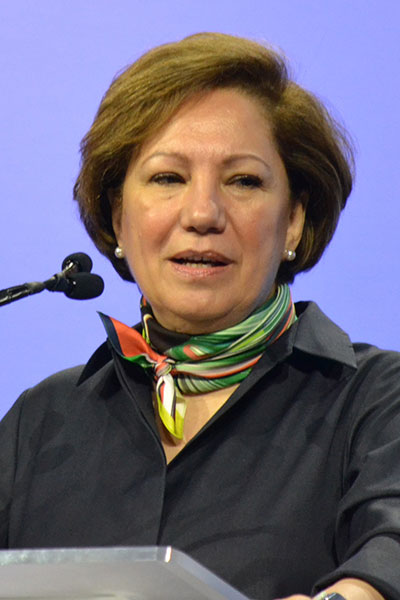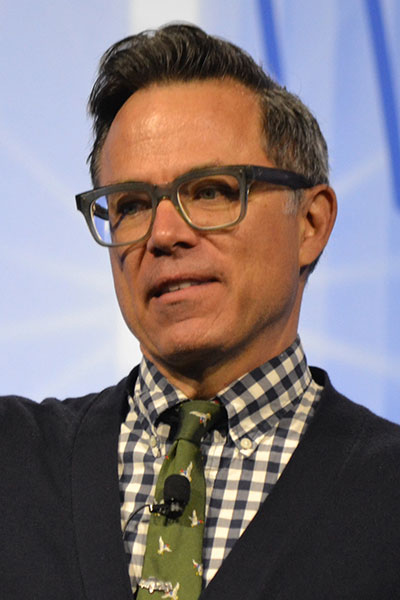The Plenary Session at the ATS 2023 International Conference held some laughs and learning with keynote speaker Timothy Caulfield, along with the installation of new ATS President M. Patricia Rivera, MD, ATSF.

Mr. Caulfield, professor of law at the Health Law Institute, University of Alberta, Canada, talked on Tuesday about the spread of misinformation in health care and called it one of the defining challenges of our time. He used examples of celebrities, such as television personality and physician Mehmet Oz and actor Gwyneth Paltrow, who have normalized the dissemination of misinformation about health and wellness.
“One of the things we study at our Institute is the constant, unproven therapies that are absolutely everywhere,” Mr. Caulfield said. “The head of the FDA has stated repeatedly over the last year: Misinformation is actually contributing to the lowering of life expectancy in the United States.”
There is an intense polarization, even a rage, associated with misinformation, he said. During the COVID-19 pandemic, people listened to claims that vaccines make people magnetic or that people can “de-vaccinate” themselves with snake venom kits.
Health care providers can make a difference in the public discourse by calling out misinformation, Mr. Caulfield said, citing falsehoods about the COVID-19 vaccine containing microchips and the government being run by “lizard people.” Some of these lies caused real harm, especially about the vaccine, he said.

“We’re not talking about debates about policy or public health issues,” Mr. Caulfield said. “If we just focus on stuff that’s complete nonsense, we can make a difference.”
Social media has changed everything, he added. Studies have shown people who get their news and information from social media are more likely to believe misinformation and more likely to spread it.
Part of the reason misinformation sinks in is that it is often driven by narrative rather than science. A tweet from rapper Nicki Minaj that said her cousin’s friend’s testicles became swollen after he received the COVID-19 vaccine provided vivid imagery that regular science doesn’t, Mr. Caulfield said.
“I’m sure you’ve experienced this in your professional lives,” he said. “Testimonials, anecdotes — they matter, and they overwhelm our ability to think scientifically. Stories work.”
There are complex social, cultural, and mental health factors behind believing false information. Mr. Caulfield reminded attendees to remain empathetic toward those who bring health misinformation into their conversations. Ideology and partisanship play a prominent role in susceptibility, often overriding science, even among physicians in one study, he explained.
Studies have shown that stepping away from social media and cable news, for even a short period, is beneficial for mental health and improves critical thinking, which is key to recognizing misinformation, Mr. Caulfield said.
He recommended countering misinformation with facts.
“You all in this room are key,” Mr. Caulfield said. “There has been an erosion in trust in health care professionals, but you still remain the most trusted voices, especially for your patients.”
He implored attendees to keep debunking myths and provided a list of ways to effectively dispel misinformation, including noting scientific consensus, considering what narratives will resonate, and remembering that the general public is the audience, not the hardcore denier.
“Let’s focus on the positive, and let’s make a real difference,” Mr. Caulfield said.
The Plenary Session closed with Immediate Past President Gregory Downey, MD, ATSF, passing the gavel to ATS President Dr. Rivera.
Her family story is one of determination and resilience, she said. Her father was from Colombia, and he met her mother in college, in Havana, Cuba. They fled Cuba and returned to Colombia, where her mother became a professor of biology and anatomy. In the 1970s, her family came to the United States, and her father died shortly after.
“I learned from my mother the value of hard work, dedication, and mostly resilience,” she said. “She was able to raise four children after becoming a widow at age 36, and she made sure we were all educated, which was her biggest mission.”
Her path to ATS leadership started slowly but gained momentum in 2019 when a past president told her that she had what it took to be a leader in the ATS and that she would make a big leap and open doors for others.
“It was the most wonderful leap I have ever taken,” Dr. Rivera said.
Read more about the ATS’s new president and her approach to leadership.
Register Today for ATS 2025

Register today for the ATS 2025 International Conference! Don’t miss the opportunity to experience this year’s premier respiratory health conference, May 16-21 in San Francisco. Join your colleagues to learn about the latest pulmonary, critical care, and sleep medicine developments. Not an ATS member? Join today and save on your conference registration!

